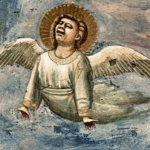A Polish Franciscan priest. A Lutheran pastor and theologian. A French, Jewish social activist attracted to Marxism. An agnostic French novelist and philosopher. A group of young German college students. The citizens of an isolated rural town in France.  What do the above persons have in common? In unique and profound ways, Maximilian Kolbe, Dietrich Bonhoeffer, Simone Weil, Albert Camus, the members of the White Rose, and the people of Le Chambon were witnesses to the power of the human spirit and the dignity of the human person in the face of unimaginable horror and atrocity.
What do the above persons have in common? In unique and profound ways, Maximilian Kolbe, Dietrich Bonhoeffer, Simone Weil, Albert Camus, the members of the White Rose, and the people of Le Chambon were witnesses to the power of the human spirit and the dignity of the human person in the face of unimaginable horror and atrocity.
This is the official catalog description of “‘Love Never Fails’: Grace, Truth, and Freedom in the Nazi Era,” a team-taught colloquium that I am in the final weeks of teaching for the fifth time in the last eight years. This is likely to be the course’s swan song, since my teaching partner from the history department officially retired last December–he agreed to teach the course with me one more time this semester, simply because we both list this course as one of our favorite two or three courses taught in our collective 60-plus years of college teaching.
During the first half of the colloquium, my colleague with whom I co-taught the colloquium and I delved with our students deeply into the dark side of the Nazis. Perhaps even more disturbing than the horrors they perpetuated were the various techniques people, with partial or even full knowledge of the atrocities, used to collaborate with, to deliberately turn away from, or to ignore evil. As we considered in the second half of the course examples of persons who did otherwise, who responded directly through words and actions to what was happening all around them, we found that the motivations for and manners of response were as varied as those responding.  Some had religious motivations, while the response of others was political in nature. Some lost their lives, while the activities of others were protected by distance and obscurity.
Some had religious motivations, while the response of others was political in nature. Some lost their lives, while the activities of others were protected by distance and obscurity.
During the final seminar of the semester yesterday, our last class before two concluding weeks of group project presentations, I gave my fifteen students the following task: Suppose, based on what we have learned this semester, that we wanted to write a handbook or guide for future generations on how to preserve and perpetuate goodness in the midst of evil. Are there common techniques or skills that the people we studied this semester invariably relied on as they responded to evil? If so, what are they? The students worked on this in small groups for twenty minutes or so, then reported back to the larger group with their results. Here, in no particular order, are some of my students’ insights and suggestions concerning how to preserve one’s character and integrity in the face of severe challenges.
Know who you are: It is very easy to become overwhelmed by the apparently monumental task of facing up to systematic evil and wrongdoing. In such situations, the only reasonable response appears to be “what can I do? I am only one person—I can’t make a difference.” But my students and I learned this semester that moral character begins with understanding who I am and what I am capable of.  I cannot change the world, but I can do something about what is right in front of me. Moral character does not require moral heroism. Consider the story of the Good Samaritan, a story frequently referenced by various people we studied. The Good Samaritan was just a guy on a trip who stumbled across an injustice that he could do something about. His response to the man dying in the ditch was not motivated by philosophy, religion, politics, or personal gain—it was simply a human response to human need. That not only is enough, it can be miraculous. As the Jewish saying goes, “he who saves one life saves the entire world.”
I cannot change the world, but I can do something about what is right in front of me. Moral character does not require moral heroism. Consider the story of the Good Samaritan, a story frequently referenced by various people we studied. The Good Samaritan was just a guy on a trip who stumbled across an injustice that he could do something about. His response to the man dying in the ditch was not motivated by philosophy, religion, politics, or personal gain—it was simply a human response to human need. That not only is enough, it can be miraculous. As the Jewish saying goes, “he who saves one life saves the entire world.”
Simplicity: One of my typical roles as a philosophy professor is to convince my students to dig deeper, because things are always more complicated than they seem.  But one of the continuing themes of this semester was that those who respond effectively to evil and wrongdoing have often reduced moral complexities to manageable proportions. The villagers of Le Chambon believed that human need must be addressed. Period. They also believed that all human life is precious, from Jewish refugees to Nazi officers. Period. The students of the White Rose believed that their country had been stolen from them and they had to help take it back. Period. Maximilian Kolbe lived his life believing that God, Jesus and the Blessed Mother love everyone. Period. In response to complaints that “things aren’t that simple,” the consistent word this semester was “sometimes they are.”
But one of the continuing themes of this semester was that those who respond effectively to evil and wrongdoing have often reduced moral complexities to manageable proportions. The villagers of Le Chambon believed that human need must be addressed. Period. They also believed that all human life is precious, from Jewish refugees to Nazi officers. Period. The students of the White Rose believed that their country had been stolen from them and they had to help take it back. Period. Maximilian Kolbe lived his life believing that God, Jesus and the Blessed Mother love everyone. Period. In response to complaints that “things aren’t that simple,” the consistent word this semester was “sometimes they are.”
Some things are more important than life. I have often asked students over the years “what things are worth dying for?” more or less as a thought experiment. But for the people we studied this semester, this was not an academic exercise. During the first half of the semester we often saw people choosing not to act or turning the other way because they were afraid for their own lives. More often than not, my students were willing to give such people at least a partial pass, arguing that self-preservation is the strongest instinct that human beings possess. Then we encountered a series of people who proved that not to be true. Just as Socrates sharply drew a contrast between “living” and “living well” more than two millennia ago, my students and I encountered a series of counterexamples to the notion that self-preservation trumps everything else. In a variety of ways, those who responded to evil demonstrated that some things are more important than guaranteeing ones continuing survival.  As Socrates argued, some lives are not worth living. A life preserved by refusing to do whatever one can to resist evil is one of those lives.
As Socrates argued, some lives are not worth living. A life preserved by refusing to do whatever one can to resist evil is one of those lives.
Spirituality: Any number of the people we studied placed their understanding of themselves and the world around them within a framework that included something greater than ourselves. My students chose to call this “spirituality” rather than “faith,” because many of the people we studied were not religious in any traditional sense. But all were convinced that we human beings are answerable to something greater than ourselves, ranging from the divine to a responsibility to create a better future. Which points toward another technique for the perpetuation of goodness . . .
Look toward the other: One of the most important keys to preserving goodness in the presence of evil is the ability to focus my attention on something other than myself. Iris Murdoch defined love as “the extremely difficult realization that something other than oneself is real,” and from the villagers of Le Chambon through Maximilian Kolbe to the students of the White Rose, my students and I regularly observed persons who had incorporated this ability into their daily life. One of the greatest hindrances to goodness is what Simone Weil called “the avaricious tentacles of the self.” There is no greater technique for escaping these tentacles than cultivating a sharp awareness of the reality of what is not me.
“the extremely difficult realization that something other than oneself is real,” and from the villagers of Le Chambon through Maximilian Kolbe to the students of the White Rose, my students and I regularly observed persons who had incorporated this ability into their daily life. One of the greatest hindrances to goodness is what Simone Weil called “the avaricious tentacles of the self.” There is no greater technique for escaping these tentacles than cultivating a sharp awareness of the reality of what is not me.
Don’t be afraid: In The Plague, Albert Camus suggests that most human evil is the result of ignorance.  Although my students resonated with this notion, they concluded on the basis of their studies that in situations of moral emergency and stress, fear is a greater problem than ignorance. There is a reason why the first thing that an angel usually says in Scripture when unexpectedly dropping into some human’s reality is “Fear not,” since we often respond to the unknown, the strange and the overwhelming with fear. The message of the human angels we studied together was “Don’t be afraid to expose your small spark of goodness in a world of darkness. It might just change a life—maybe yours.”
Although my students resonated with this notion, they concluded on the basis of their studies that in situations of moral emergency and stress, fear is a greater problem than ignorance. There is a reason why the first thing that an angel usually says in Scripture when unexpectedly dropping into some human’s reality is “Fear not,” since we often respond to the unknown, the strange and the overwhelming with fear. The message of the human angels we studied together was “Don’t be afraid to expose your small spark of goodness in a world of darkness. It might just change a life—maybe yours.”
Perhaps the most remarkable feature of these common techniques is their shared accessibility. Self-knowledge, simplicity, the ability to recognize what is truly important, spiritual awareness, courage—these are not magical moral weapons available only to saints and heroes. I can do this. You can do this. But only if we start now. Good habits can only be developed through repetition; we only become skillful wielding the weapons of the spirit through practice. Let’s get started.












